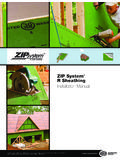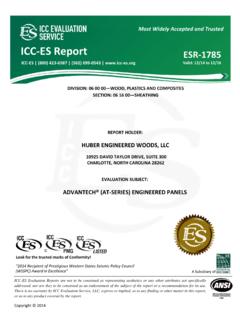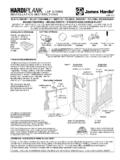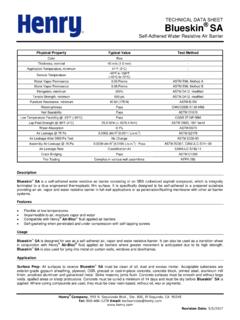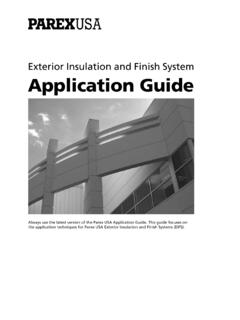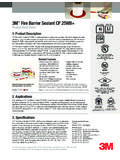Transcription of Contents
1 Contents 02 ZIP System R-Sheathing General Notes, Guidelines and Limitations 03 ZIP System R-Sheathing Installation 05 Structural Bracing to Resist Lateral Forces 06 ZIP System Tape Installation ZIP System R-Sheathing Panel Seams ATTENTION: This installation guide is intended to provide general information for the designer and end user. The following guidelines will help you properly install the ZIP System R-Sheathing. We urge anyone installing this product to read these guidelines in order to minimize the risk of safety hazards and to prevent voiding any applicable warranties.
2 This manual is a general installation guide and does not cover every installation condition. Proper installation shall be deemed to mean the most restrictive requirement specified by Huber Engineered Woods (HEW), local building code, engineer or architect of record or other authority having jurisdiction. Please acknowledge that it is solely your obligation for all safety requirements and code compliance. For additional information, contact Huber Engineered Woods LLC. ZIP System R-Sheathing Safety Guidelines - Follow all OSHA regulations and any other safety guidelines and safety practices. - Use approved safety belts and/or harnesses or other fall protection equipment.
3 - Install ZIP System R-Sheathing and ZIP System tape only in dry conditions and on dry surfaces. Do not install in rain, snow, frost or other slippery conditions. - Do not apply flame directly to foam layer. Foam will burn and smoke if exposed to an ignition source of sufficient heat and intensity or open flame, such as a welder's torch. What is ZIP System R-Sheathing? ZIP System R-Sheathing panels consist of an oriented strand board panel laminated with a water - resistive facer on the exterior and a rigid foam insulation panel bonded on the opposite (interior) face. When properly installed and taped, ZIP System R-Sheathing provides a water - resistive barrier, air barrier and exterior insulation in one product.
4 It may also be used in the construction of braced wall panels or shear walls in certain conditions. See the Structural Bracing to Resist Lateral Forces section of this installation manual for more information. The OSB substrate complies with Voluntary Product Standard PS2 for wood structural panels and the water - resistive barrier complies as an alternate to the water - resistive barrier prescribed in the code. ZIP System R-Sheathing is available with a 1/2-inch, 1- inch, 1-1/2-inch and 2-inch foam insulation panel. ZIP System R-Sheathing Includes: - ZIP System wall sheathing panels with built-in water - resistive barrier and preprinted fastening and tape guides.
5 - Foam insulation panel. - ZIP System tape. ZIP System R-Sheathing 07 ZIP System R-Sheathing Window Installation 08 ZIP System R-Sheathing Exterior Cladding Installation: Lap Siding 09 ZIP System R-Sheathing Exterior Cladding Installation: Anchored Masonry Brick Veneer Storage and Handling - Set panel stack on three supports (stickers) to keep a minimum of 4 inches of clearance above ground level. - Outdoors, cover panels loosely with a waterproof protective material such as a tarpaulin. - Anchor covers on top of the stack, but keep away from sides and bottom to assure good air circulation. - In high moisture environments, cut banding on the panel stack to prevent edge damage.
6 - Factory applied packaging is intended only for protection during transit. - Packaged units must be stored indoors or within a covered structure. - For temporary job-site storage, units should be stacked on pallets at least three inches above ground level and completely covered with a weatherproof covering such as a tarpaulin. - The temporary factory-applied packaging should be slit or removed to prevent accumulation of condensation. - Do not stack more than three units high. ZIP System R-Sheathing Notes and Limitations - ZIP System R-Sheathing is approved for wall use only. Do not use on roofs. - Do not use abutted against stone or masonry without providing a minimum of a 1/2-inch gap.
7 - Do not install ZIP System tape in temperatures less than 20 F. - ZIP System R-Sheathing products are not approved for manufactured housing applications that are built under a federal building code administered by the Department of Housing and Urban Development (HUD). - Not intended to replace traditional wood structural panels in applications where the wall sheathing is designed to resist combined wind uplift and shear. - Do not use in fire-rated assemblies in lieu of a required wood structural panel. - Do not apply secondary coatings to the overlay on ZIP System R-Sheathing. - Minimum 1/2-inch gypsum wall board must be installed on the interior side of the wood wall studs as a thermal barrier using code-recognized fasteners per IRC or IBC requirements.
8 - Only use in buildings of Type V construction or construction permitted under the International Residential Code. - In areas where the probability of termite infestation is very heavy the clearance between ZIP System R-Sheathing and finished grade shall be no less than 6-inches. Note: In cladding systems requiring multiple layers of water - resistive barriers, like traditional hard-coat stucco and adhered stone veneers, ZIP System R-Sheathing is intended only to replace the first layer. 2 ZIP System R-Sheathing Installation Manual ZIP System R-Sheathing Installation Overview: ZIP System R-Sheathing is composed of ZIP System wall sheathing panels, laminated exterior foam panel insulation and ZIP System seam sealing tape.
9 ZIP System R-Sheathing panels should be fully installed before the seam sealing tape is applied. The following manufacturer installation steps and recommendations are presented as a general outline of the installation process. You are fully and solely responsible for all safety requirements. Good construction practices should be followed at all times. Step 1. Install any necessary mechanical strapping directly to framing. Any metal straps, ties or other connectors designed to resist uplift, shear or diaphragm loading must be installed prior to ZIP System R-Sheathing installation. The requirement for mechanical uplift connections shall be determined by the designer- of-record, local building codes or authority having jurisdiction.
10 Detail A should not be considered typical and only applies when mechanical uplift connections are specified. Straps, ties and connectors installed on the exterior face of stud will not be visible after ZIP System R-Sheathing panels are installed. Schedule any necessary anchor or nailing inspections accordingly. DETAIL A Step 2. Install ZIP System R-Sheathing panels positioned with the water - resistive barrier facing out. The panels may be installed with the long side of the panel oriented either horizontally or vertically to the framing members.
